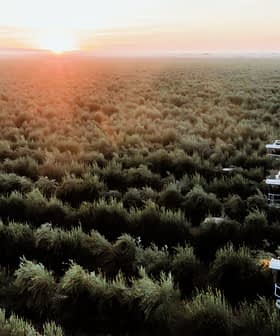Enhanced access to international markets, the streamlined adoption of standard procedures, and the implementation of best farming practices are a few reasons why the Azerbaijani olive oil sector celebrates the country’s accession to the International Olive Council (IOC) as its 21st member.
According to Vahid Novruzov, the chief executive of Agro Food Investments, one of the largest agricultural holdings in the country, interest in olive farming is growing in Azerbaijan, with expectations that the olive-growing area could double to 15,000 hectares in the next few years.
“Becoming a member of the IOC is a significant milestone for us,” Novruzov told Olive Oil Times. “It took more than two years to achieve this goal, which was made possible by the support from the Ministry of Agriculture. This membership is important as it aligns with the goals and aspirations of the olive oil industry.”
See Also:The Growing Pains of Albania’s Ascendant Olive Oil SectorNestled between Russia and Iran and maintaining close ties with neighboring Georgia, the Azerbaijani government and entrepreneurs have significantly invested in establishing a modern olive oil industry in recent years.
“On behalf of the International Olive Council, I am thrilled to welcome Azerbaijan as our newest member,” said Jaime Lillo, the IOC’s executive director.
“Azerbaijan, which has participated as an observer country at the IOC since 2021, has a rich history and traditions that will surely contribute to the IOC’s mission of promoting the growth and sustainability of olive cultivation and trade, protecting consumers and enhancing their knowledge about olive oil’s numerous health benefits,” he added.
George Svanidze, a Georgian entrepreneur and former IOC president, confirmed that the announcement is big news for the Azerbaijani olive oil sector.
“We have been in discussions with the Azerbaijani government for several years, exchanging visits in Spain and Georgia as olive production in the country showed excellent results,” he said.
Svanidze, whose companies and associated farmers are also heavily investing in establishing new olive groves in Georgia, noted that Azerbaijan’s accession to the IOC would facilitate foreign expert support and quality certifications for olive oil production.
“Our Azerbaijani friends have seen how significant the IOC and its experts are with our olive expansion projects in Georgia,” he said. “Thanks to that, we have planted 1.2 million olive trees here.”
“Thanks to the IOC support, we are also investing in new technologies and machinery and starting work on new state-of-the-art olive oil mills,” Svanidze added.
Olive trees have been growing for centuries in Azerbaijan, most notably on the Absheron Peninsula, where the favorable climate conditions prompted the government to support further developments.

Azerbaijan produced about 1,000 tons of olive oil in the 2023/24 crop year. (Photo: Grand Agro)
The goal of the latest efforts is to reclaim neglected land while also providing opportunities for local farmers.
“In 2018, our company, Grand Agro, purchased approximately 200 hectares of old olive groves not far from Baku,” Novruzov said. “They were dilapidated, in very poor shape, and left to die out. This was the remnant of what was once a large collective farm.”
The company worked to reinstate the old orchards and plant many new trees.
“In the early years, we learned a lot about orchard management, resulting in about 30 percent of our orchards being traditional, with trees spaced up to five meters apart,” Novruzov said. “The rest are intensive and super-intensive.”
“With modern irrigation and fertilization, we can now aim to harvest up to seven or eight tons of olives per hectare,” he added.
The company, the largest olive oil producer in the country, produced 600 tons of olive oil in 2023, more than 50 percent of Azerbaijan’s total production.
“We aim to produce 1,000 tons in the near future,” Novruzov said. “The demand is there, as we export to Spain, Israel, Russia, the United Arab Emirates and Turkey.”
This olive crop expansion is not limited to Azerbaijan and Georgia. “There is an ongoing process across the entire region,” Svanidze said. “We have been in discussions with officials in several countries, and there is a high level of interest in supporting further investments in olive oil.”
“Georgia and Uzbekistan are already IOC members. Following Azerbaijan, we foresee that the Kazakh government’s interest could lead to developing closer ties with the International Olive Council,” he added. “Looking ahead, Turkmenistan authorities and farmers are also showing interest.”

Azerbaijan is part of a cohort of countries where cliamte change is expanding the possibilities of olive growing. (Photo: Grand Agro)
According to Svanidze, these countries’ interest in developing their olive industries coincides with the urgent need for the global olive industry to adapt to the changing climate.
In a January interview with Olive Oil Times, Lillo said one of the IOC’s missions is to expand olive cultivation globally to mitigate the impacts of extreme heat and drought in the Mediterranean on global olive oil supplies.
“Even though countries such as Georgia, Azerbaijan, Uzbekistan and Kazakhstan have cooler climates than Mediterranean countries, many olive varieties grow very well here,” Svanidze said.
“Having new producing countries is a strategic mission in this scenario [of consecutive poor harvests fueled by high temperatures and drought], which has caused skyrocketing prices for olive oil almost everywhere,” he added.
Novruzov said that the situation is changing quickly in Azerbaijan. “When we started, Azerbaijan had about 3,800 hectares of olive groves, most of which were in poor condition,” he said. “Now we have more than 7,000 hectares of productive olive orchards.”
According to Svanidze, developing a strong olive industry might also foster better understanding among the involved countries in a region where conflicts and tensions have often hindered local efforts.
“Birds bring olive tree branches across the whole world,” Svanidze said, alluding to the Biblical dove and the olive branch it brought to Noah as a peace offering.
“When people see the olive trees they have planted and realize how long they can live, it changes their mindset,” he added. “This is a significant motivation for peace and stability worldwide.”









